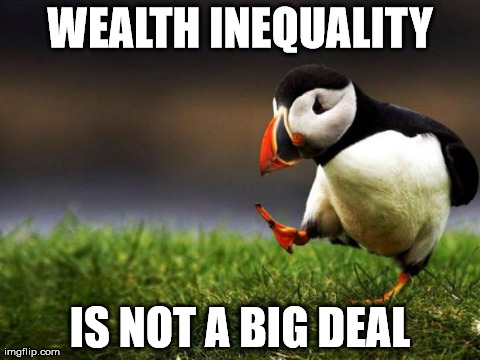
Taki Magazine publishes articles that it thinks its readers will enjoy- usually a mix of libertarian and conservative themes. Many readers identify as ideologically conservative regarding things like cultural traditions, religion, family, guns, and border control – but with the notable exception of capitalism – where some more often than not, are in agreement with the left. This is part of a growing epidemic of Pat Buchanan inspired small government liberalism -a blame the rich, who is me attitude that has become pervasive among some on the right who feel left out of the wealth creation boom and are looking for a scapegoat for their problems. Instead of outright dismissing Piketty, a basic income, or raising the minimum wage, some on the right are defecting. They want to believe America is in decline, that the economy is run by a cabal of elite, or that wealth inequality is a big deal. On this blog, reality is more important than ideology. If some on the right think we’re in a recession, we have no trepidation of elucidating the flaws of their reasoning.
Is America in decline? Hardly, especially compared to the rest of the world. Just recently snapchat, airbnb, dropbox, and pinterest – all companies that were created before 2008- were valued at $3-10 billion each. Apple just bought Dr. Dre headphones for $4 billion. Stocks are at historic highs and inflation still rock bottom. We’re doing better than ever. Or as Louis Ck says, everything is wonderful and no one is happy.
A monarchy or welfare state is good for below average people, while meritocracy such as America is optimal for above average , smart high-IQ achievers. You want to multiply the benefits to create incentives for smart, hard working people to create technologies that grow the economy rather than become servants to the state. There are elements of luck and genetics, but incentives play a role, too. That’s why GM failed because it was uncompetitive and below-average workers were overpaid. There was little incentive to succeed and failure was not punished. These Nordic countries suffer from this same sclerosis but it may take longer for them to fail, which they will like Greece within the next few decades we predict.
The left seeks economic crisis and violence as a conduit to punish the rich and upend the elite power structure so it can be remolded to a more egalitarian one of their choosing. Steven Pinker says the world is becoming less violent but the left disagrees, actively seeking violence because they have no faith in humanity and the economy ,and worse yet, want to bring the world down to their level. In 2008 when the market was crashing and the banks were failing the liberal media like the NYT fanned the flames of panic to get Obama elected. Chuck Schumer single-handedly created a run on Indy Mac by penning a letter that the bank was insolvent; the management denied it, but the damage was done and the bank failed as customers withdrew their money.
But what about the elite wanting to enslave us? Enslavement or servitude is a staple of dystopian science fiction, but the reality is quite different. Aside from our consumer spending, the elite want nothing to do with us. Why else do the richest buy private planes, first class tickets and $800k golf memberships, so they can bask in the aura of the uncouth masses? Compared to parts of Africa we’re in the ‘elite’, but are we conspiring to enslave them? As much as the left insists low wages are dehumanizing – for even the lowest positions – the supply of labor far exceeds the demand. It’s harder to get a job at a McDonald’s opening than getting into Harvard. At at national hiring day, McDonalds just hired 62000 people. Over 1 million people applied for these jobs. That’s a 6.2% acceptance rate – or about less than Harvard. The elite have a problem of too many people wanting to work for them, not a shortage that would necessitate slavery.
Also, the wealthiest do pay their fair share. There’s something called capital gains tax and a dividends tax, which is essentially a form of double taxation on capital. First the company pays taxes on its earnings and then when it uses those earnings to pay dividends the recipients are also taxed.